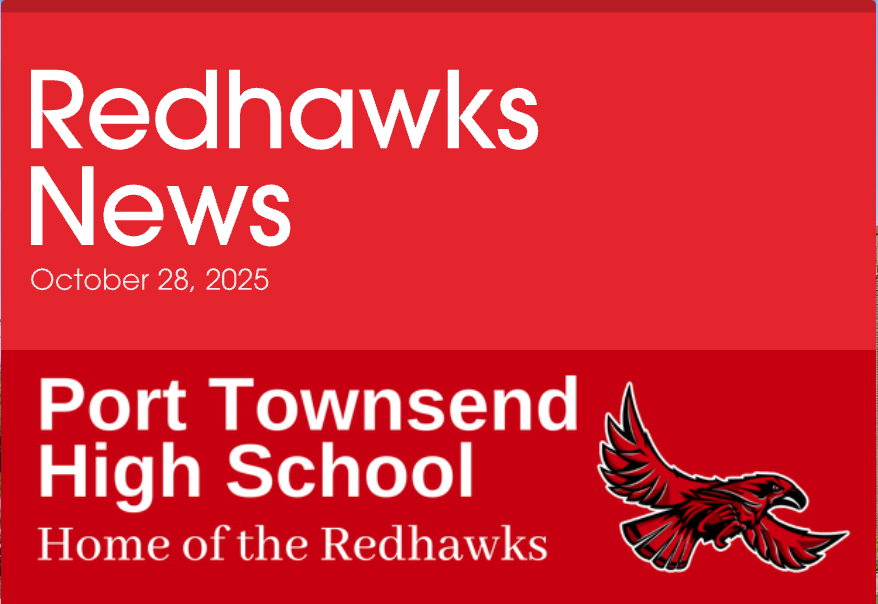Redhawks News October 28, 2025 | | |

|  | Para leer en español haga clic para ver el recuadro negro. Haga clic en "Translate Newsletter". Seleccione "Spanish." | |  |
Students in Mr. Weiseth’s Maritime Woodworking class recently took part in a hands-on field experience that connected them to the land, their community, and the full cycle of sustainable forestry. The collaboration began when Mr. Weiseth met Devon Buckham from the Jefferson Land Trust during a place-based education inservice this past August. “I mentioned that I was interested in students maybe making some benches or information stands for the Land Trust,” said Weiseth. “Devon told me he was interested in a partnership that could bring locally harvested trees to the school that could then be used for community projects such as a bench for a park, the school, or the Jefferson County Land Trust’s trail system.”
From that initial idea, the partnership quickly grew into a powerful place-based learning opportunity. Weiseth explained, “As we worked out how to make things happen, it eventually evolved into Devon visiting the school to discuss what makes a forest a forest, what is a natural resource, and how are people connected to natural resources. Next, we visited Chimacum Ridge to meet with a forest manager to discuss those same questions, harvested a tree, and it was delivered to our school.”
For students, the day was both educational and memorable. Sophomore Ella Welte described it as “a very eventful, hands-on experience with lots of learning.” Students spent the day measuring trees, estimating heights, and learning how professionals assess forest health. “We measured trees and used devices and different ways to estimate the heights,” Ella said. “We also cut down a tree to use for a community project!”
The harvested wood now sits behind the shop, waiting to be milled on-site with the help of community volunteers. “The wood will be milled at the high school into usable lumber,” explained Weiseth. “Some of the lumber we will use this year for a community bench, and some we will cure for next year’s students. After this year, students will harvest the wood that will be used by the next year’s students.”
For Weiseth, this project reflects the value of connecting education to sustainability and workforce development. “I hope that students see and understand forests as multi-value ecosystems: ecological, cultural, and economic,” he said. “They experience the milling process and connect math and engineering to real-world resource use.” He also noted that the program’s success has drawn attention beyond Port Townsend: “I was told the Governor may directly see materials from this program including photos from our visit. Our school was the first to participate in the Tree to Table Saw program, which is being monitored by a state-level manager for Youth Outreach and Education at DNR. They have a vested interest in highlighting it.”
The learning extended beyond science and craft. For Ella, the project’s purpose deepened her appreciation for sustainability. “The tree we chose was going to be cut down anyways due to a turnaround for logging trucks,” she said, “so at the very least, this tree was used for good.” She added that knowing the wood would become benches for outdoor learning “gave the field trip a sense of accomplishment and reason, not like we were just going for nothing.”
Hands-on projects like this one align directly with the goals of Port Townsend’s CTE programs: connecting students to real-world opportunities and building authentic engagement. “There are seven different steps from a tree being harvested in the forest to a piece of lumber being sorted and graded in a lumber yard,” said Weiseth. “Each step is a potential career path.”
Ultimately, both teacher and students agree that this project has been transformative. “We are connected to the land around us and with the people in our local communities,” Weiseth reflected. “It is healthy for students to witness and feel connected to the land they live in.” Ella echoed that sentiment, saying, “I think it makes memories that we’ll remember and we’ll learn things that will stick with us for a long time.” | |  |
This year, Port Townsend High School introduced Business Law and Trial Practice, a new Career and Technical Education (CTE) course that’s quickly become one of the most dynamic additions to the curriculum. The class, taught by Mr. Kubik, immerses students in the fundamentals of law while connecting them directly with professionals working in the field, from attorneys and judges to recent PTHS graduates now practicing law.
“The goal is to expose students to as many different local lawyers and judges as possible,” explained Mr. Kubik. “I want them to see that there are many different legal careers and pathways to becoming a lawyer, and that some of those paths were walked by PTHS graduates who are now members of the local bar.”
Through a partnership with the Jefferson County Bar Association, coordinated by its president, Ariel Speser, the class has already hosted a series of nine guest speakers representing a wide range of legal specialties, from criminal and civil law to environmental and tribal law. Students have also heard from local judges who shared insights into the daily realities of courtroom life.
For sophomore Jolene Benton, one speaker stood out in particular: “The speaker that stood out to me the most was Anna Brady, who does environmental work and Native American practices,” she said. “It’s been neat to hear how different a criminal lawyer is from an environmental lawyer.”
The class’s experiential approach reflects one of the core goals of CTE: connecting students with real-world, hands-on learning experiences and introducing them to post-secondary possibilities. Students not only learn about legal theory but also engage in trial simulations like The Case of the Pumped-Up Protein Powder, a mock trial written by Mr. Kubik. “It’s about a D1 wrestler who loses their scholarship after testing positive for anabolic steroids,” he said. “Students use trial practice tips shared by our guest speakers to build their cases and deliver arguments.”
For Jolene, those simulations have been a highlight: “We get to pick which part we want to be in the trials and you can kind of make stuff up as you go while following within guidelines,” she said. “It’s a lot more fun and creative compared to sitting there reading and writing about something.”
The professional visits will lead to one-day job shadows this spring, where students will have the chance to spend time with local attorneys and judges. Many of the speakers have already offered to host students or mentor them in senior projects and mock trial activities. “Meeting local lawyers and judges helps give students future options for internships, clerkships, and even full-time jobs,” said Mr. Kubik. “The local Bar has been incredibly supportive of the class and of our students.”
For students like Jolene, these experiences are already shaping future goals. “One of the goals I have in life is to be a lawyer,” she said. “I really want to practice environmental law, and having Anna Brady come in helped me broaden my horizon on what that could look like.”
As Mr. Kubik puts it, the class is about more than just learning how to argue a case - it’s about showing students that the courtroom isn’t an abstract idea, but a real place they could one day belong. | |  |
Each Tuesday and Thursday afternoon, the Port Townsend High School library hums with focused energy as students gather for after-school tutoring. Among them is John Ward, a dedicated volunteer whose patience and calm guidance have made him an essential part of the program’s success. John volunteers at PTHS through our partnerships with Skillmation, a community-based nonprofit in Jefferson County that connects skilled volunteers with learners across our schools.
John began volunteering shortly after moving to Port Townsend in 2019. “Early in 2020 I saw a billboard looking for help in the schools,” he said. “I had retired from running a math help center at a university and had taught high school as well, so it seemed a natural fit. I contacted Skillmation and got in with the first remote-tutoring group. When campuses opened up again, I just kept coming.”
Since then, John has become a steady presence in both math classrooms and after-school sessions. “It’s great to see a student’s eyes when something that was complete chaos suddenly makes sense,” he said. “After-school tutoring is a fun challenge. We have many repeat visits, but you never know who will show up or what they’ll be working on.”
Mr. Taylor, a PTHS science and math teacher who leads the after-school tutoring program, is quick to highlight Ward’s impact. “John is an amazing volunteer,” he said. “He’s patient, nonjudgmental, and makes every student feel comfortable. He’ll stay with them for as long as it takes to help them truly understand the concept.”
The tutoring program now averages 15 to 20 students per session and has become one of the most well-attended after-school opportunities on campus. “Without the Skillmation volunteers, there’s no way I could manage the sheer number and diverse needs of students who come in,” Mr. Taylor said. “With John Ward and the other volunteers, the success we’ve had simply wouldn’t be possible.”
For John, the reward is in seeing growth firsthand. “Students leave the library with a little more confidence in their abilities or just the satisfaction of mastering a particular problem,” he said. “I enjoy the challenge of helping students make sense of math. In the process, I get to see them growing into strong, positive, confident selves.”
Skillmation’s partnership with local schools extends beyond tutoring from supporting 9th Grade Mentoring to Senior Project Mentoring to Future Finder for juniors, and even chess mentoring across all campuses. But it’s through subject coaching, like John’s work in the library, that students experience daily academic support and meaningful connection.
When asked what he would say to someone considering volunteering, John’s answer was simple: “Helping students thrive can be a very rewarding experience. This school district is open and welcoming to folks who want to make a difference.”
For the students who gather each week, that difference is clear: one question, one breakthrough, and one smile at a time. | |  | |  | |  | |  | | - Wednesday, 10.29: 🏠 House Competition During 7th Period 🏠
- Wednesday, 10.29 from 1:30 - 3:15: Staff Department Meetings & Collaboration in the Library
- Wednesday, 11.5: School Links Activity in House Advisory
- Wednesday, 11.5 from 1:30 - 3:15: Staff District-Wide Committee Meetings at PTHS
- Sunday, 11.2 from 2:00 - 5:00pm: Day of the Dead Celebration in the PTHS Library
| Stay connected to PTHS through our website!
| About Port Townsend High School | Non-discrimination statementPort Townsend School District No. 50 does not discriminate in any programs or activities on the basis of race, creed, religion, color, immigration status, national origin, age, honorably-discharged veteran or military status, sex, sexual orientation, gender expression or identity, marital status, the presence of any sensory, mental or physical disability, or the use of a trained dog guide or service animal by a person with a disability. The district provides equal access to the Boy Scouts of America and all other designated youth groups listed in Title 36 of the United States Code as a patriotic society. The following employees have been designated to handle questions and complaints of alleged discrimination:
Civil Rights Compliance Coordinator
Carrie Ehrhardt 1610 Blaine Street (360) 680-5756 cehrhardt@ptschools.org
Title IX Officer:
Carrie Ehrhardt 1610 Blaine Street (360) 680-5756 cehrhardt@ptschools.org
Section 504/ADA Coordinator
Shelby Macmeekin 1610 Blaine Street (360) 379-4501 smacmeekin@ptschools.org
Title IX inquiries may also be directed toward the U.S. Department of Education, Office for Civil Rights (OCR):https://www2.ed.gov/about/offices/list/ocr/index.html
Discrimination Procedure
|  |  | Sean Moss Sean is using Smore to create beautiful newsletters |
|
|
|
|
|
 | |
|

